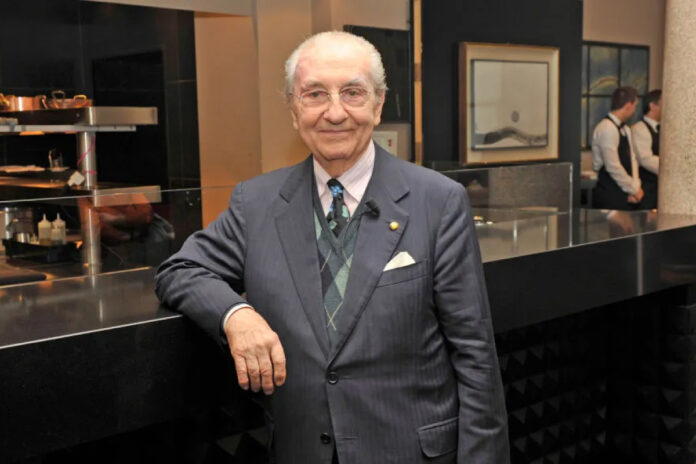Gualtiero Marchesi is widely celebrated as the father of modern Italian cuisine. His pioneering approach to gastronomy, blending traditional Italian flavors with innovative techniques and artistic presentation, has left an indelible mark on the culinary world. This article explores Marchesi’s life, his significant contributions to modern Italian cuisine, and his enduring legacy.
Early Life and Education
Birth and Background
Gualtiero Marchesi was born on March 19, 1930, in Milan, Italy. He grew up in a family deeply rooted in the culinary arts. His parents owned and operated the Albergo del Mercato, a hotel with a restaurant in Milan. This early exposure to the world of food and hospitality ignited Marchesi’s passion for cooking and laid the foundation for his illustrious career.
Training and Influences
Marchesi’s formal culinary education began at the prestigious Culinary Institute in Lucerne, Switzerland. Here, he gained a solid grounding in classical cooking techniques and developed a deep understanding of the culinary arts. After completing his studies, he embarked on a series of apprenticeships in some of France’s most esteemed restaurants, including the renowned Le Chapeau Rouge in Dijon and Ledoyen in Paris. These experiences exposed him to the intricacies of French haute cuisine and significantly influenced his culinary style.
Rise to Culinary Prominence
The Opening of Ristorante Gualtiero Marchesi
In 1977, Gualtiero Marchesi opened his eponymous restaurant, Ristorante Gualtiero Marchesi, in Milan. This marked a pivotal moment in his career and in the history of Italian cuisine. The restaurant quickly gained acclaim for its innovative approach to traditional Italian dishes, blending classical techniques with contemporary presentation and flavors. Marchesi’s meticulous attention to detail and his insistence on using the finest ingredients set new standards for Italian dining.
Michelin Star Recognition
Ristorante Gualtiero Marchesi became the first restaurant in Italy to receive three Michelin stars, the highest honor awarded by the prestigious Michelin Guide. This accolade not only solidified Marchesi’s reputation as a culinary maestro but also put Italian cuisine on the global gastronomic map. His restaurant became a pilgrimage site for food enthusiasts and aspiring chefs from around the world.
Pioneering Modern Italian Cuisine
The Evolution of Italian Cuisine
Gualtiero Marchesi is credited with transforming Italian cuisine by elevating it to new heights. He embraced a philosophy of simplicity, focusing on the purity and quality of ingredients. Marchesi’s dishes often featured a minimalistic presentation, allowing the natural flavors of the ingredients to shine. His innovative techniques and artistic plating redefined Italian culinary traditions.
Signature Dishes
Marchesi’s repertoire includes several iconic dishes that have become benchmarks of modern Italian cuisine. One of his most famous creations is the “Risotto alla Milanese,” a classic dish that he reinterpreted by adding a touch of saffron and serving it with a sheet of gold leaf. This dish exemplifies Marchesi’s ability to transform simple ingredients into something extraordinary.
The Open Raviolo
Another signature dish is the “Open Raviolo,” which deconstructs the traditional ravioli into an open-faced pasta, topped with fresh ingredients like seafood or vegetables. This innovative approach not only enhances the visual appeal of the dish but also intensifies the flavors, showcasing Marchesi’s ingenuity and creativity.
The Dripping of Fish
“The Dripping of Fish” is another masterpiece that reflects Marchesi’s avant-garde style. Inspired by the works of Jackson Pollock, this dish features various types of fish arranged artistically on a plate, drizzled with colorful sauces to create an abstract and visually stunning presentation. This dish encapsulates Marchesi’s philosophy of combining art and food.
Contributions to Culinary Arts and Education
Culinary Schools and Mentorship
Gualtiero Marchesi was not only a master chef but also a dedicated educator. In 1986, he founded the Italian Culinary Academy, Alma, in Colorno, near Parma. This institution quickly became a leading center for culinary education, attracting students from all over the world. Marchesi’s commitment to nurturing the next generation of chefs ensured that his innovative techniques and philosophies would continue to influence the culinary world.
Promoting Italian Cuisine Globally
Marchesi’s influence extended far beyond Italy. He frequently traveled internationally, participating in culinary events and promoting Italian cuisine on the global stage. His efforts helped to elevate the perception of Italian food from rustic and homey to sophisticated and refined. Marchesi’s impact on the global culinary community is evident in the widespread appreciation and recognition of Italian cuisine today.
Major Achievements and Recognition
Awards and Honors
Throughout his illustrious career, Gualtiero Marchesi received numerous awards and honors, reflecting his exceptional contributions to the culinary arts. In addition to his Michelin stars, he was awarded the prestigious Ambrogino d’Oro, Milan’s highest civic honor, in recognition of his services to the city’s cultural and culinary heritage.
Publications
Marchesi also authored several influential cookbooks, sharing his knowledge and philosophy with a wider audience. His books, such as “The Marchesi Code” and “Opere/Works,” offer insights into his creative process and provide recipes that reflect his innovative approach to cooking. These publications have become essential references for chefs and food enthusiasts alike.
Marchesi’s Influence and Legacy
The Marchesi Method
Gualtiero Marchesi’s influence on modern cuisine is profound and enduring. His emphasis on simplicity, quality ingredients, and artistic presentation has inspired countless chefs around the world. The “Marchesi Method,” characterized by minimalism and elegance, continues to be a guiding principle for contemporary culinary practices.
Mentorship and Influence on Chefs
Many of today’s most renowned chefs have been directly influenced by Marchesi’s teachings and mentorship. Chefs such as Carlo Cracco, Davide Oldani, and Andrea Berton all trained under Marchesi, carrying forward his legacy and perpetuating his innovative spirit in their own restaurants. Marchesi’s role as a mentor has ensured that his culinary philosophy continues to shape the future of gastronomy.
Enduring Legacy
Gualtiero Marchesi passed away on December 26, 2017, but his legacy lives on through his numerous contributions to the culinary world. The Gualtiero Marchesi Foundation, established in his honor, continues to promote culinary excellence and education. The foundation organizes events, scholarships, and culinary programs that uphold Marchesi’s commitment to innovation and quality in cuisine.
Personal Life and Character
Relationships and Personality
Marchesi was known for his charismatic personality and his ability to connect with people from all walks of life. His relationships with fellow chefs, students, and patrons were characterized by mutual respect and admiration. Marchesi’s humility and generosity endeared him to many, further enhancing his reputation as a beloved figure in the culinary world.
Philosophy and Vision
Marchesi’s culinary philosophy was rooted in the belief that food should be an expression of art and culture. He viewed cooking as a form of artistic creation, where the chef, like an artist, could convey emotions and tell stories through their dishes. This vision guided his approach to cooking and inspired those who followed in his footsteps.
FAQs
1. What are some of Gualtiero Marchesi’s most famous dishes?
Some of Gualtiero Marchesi’s most famous dishes include “Risotto alla Milanese,” “Open Raviolo,” and “The Dripping of Fish,” all of which showcase his innovative approach to traditional Italian cuisine.
2. How did Gualtiero Marchesi influence modern Italian cuisine?
Gualtiero Marchesi influenced modern Italian cuisine by emphasizing simplicity, quality ingredients, and artistic presentation. His innovative techniques and philosophy transformed traditional Italian dishes and elevated them to new heights.
3. Where can I learn more about Gualtiero Marchesi’s culinary philosophy?
You can learn more about Gualtiero Marchesi’s culinary philosophy through his cookbooks, such as “The Marchesi Code” and “Opere/Works,” as well as through the Gualtiero Marchesi Foundation, which continues to promote his legacy and teachings.
4. What is the Gualtiero Marchesi Foundation?
The Gualtiero Marchesi Foundation is an organization established to honor Gualtiero Marchesi’s legacy. It promotes culinary excellence and education through events, scholarships, and programs that uphold Marchesi’s commitment to innovation and quality in cuisine.
5. How did Gualtiero Marchesi’s training and experiences influence his cooking style?
Gualtiero Marchesi’s training at the Culinary Institute in Lucerne and his apprenticeships in prestigious French restaurants exposed him to classical cooking techniques and haute cuisine. These experiences significantly influenced his cooking style, which blended traditional Italian flavors with contemporary presentation and techniques.
Conclusion
Gualtiero Marchesi’s contributions to modern Italian cuisine are unparalleled. His innovative techniques, artistic vision, and commitment to culinary excellence have left an indelible mark on the gastronomic world. From his groundbreaking dishes to his influential teachings, Marchesi’s legacy continues to inspire and shape the future of Italian cuisine. As the father of modern Italian cuisine, Gualtiero Marchesi’s impact will be felt for generations to come, ensuring that his name remains synonymous with culinary artistry and innovation.




